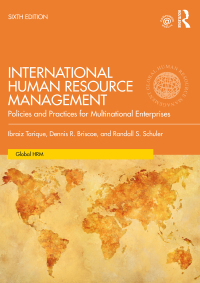In the new world of a global workforce and firms foci on global talent management, multinational firms
Question:
In the new world of a global workforce and firms’ foci on global talent management, multinational firms are tapping more “third-country” nationals for overseas posts. The increase in operations in emerging markets, the high costs of traditional international assignments, and shortages of needed skills in many markets have led to the search for employees from countries other than the parent country of headquarters or the host country of subsidiaries, employees who are referred to as “third-country nationals” (TCNs). These TCNs often win jobs because they speak several languages (particularly English and the host-country language) and know an industry and/or foreign country well. The average number of third-country nationals continues to rise from year to year, according to consultants such as Organization Resources Counselors.
ANPRU Fashions is one of the leading designers and manufacturers of children’s garments in Southeast Asia. The company has a global workforce of 6,000 employees in 16 countries and employs 49 TCNs in strategic leadership jobs in countries with difficult living conditions. Kimarli Watawala, a global mobility consultant at a leading management consulting firm in Sri Lanka suggests:
Global manufacturers like ANPRU prefer TCNs in top global posts. TCNs are more willing to relocate to overseas, and are likely to move around from country to country. They are less likely to ask for high and complex remuneration packages relative to parent country nationals.
Similar to Kimarli Watawala, Ayaan Rabbani, who is the Vice President of Global HR in ANPRU’s European headquarter, appreciates TCNs but is concerned about the five TCNs that went to work for competitor foreign subsidiaries two years after starting the foreign assignment. He is always concerned about their level of work commitment........
Case study questions
1. What culture-related problems and issues do you see in these uses of thirdcountry nationals?
2. How can those culture-related concerns be understood and dealt with?
3. What role does international HR need to take in coping with the cultural issues presented by the use of TCNs?
4. Are there other alternatives for finding enough talent to fill global needs?
Step by Step Answer:

International Human Resource Management Policies And Practices For Multinational Enterprises
ISBN: 9781138489493,9780429806124
6th Edition
Authors: Ibraiz Tarique , Dennis R. Briscoe , Randall S. Schuler





